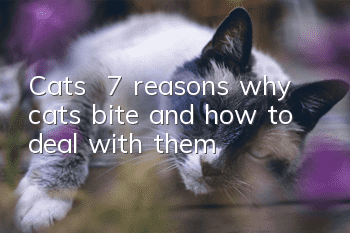Cats | 7 reasons why cats bite and how to deal with them

Cat biting is a very common behavioral problem among cat owners, second only to inappropriate urination. So how to deal with the trouble of cat biting? Let’s take a look with the editor:
1. Aggression in the game
Although we treat cats as pets, they still retain the instinct to crawl, stalk, and attack. They will regard any small object as imaginary prey, and then get the most out of attacking their sleeping owners, their feet, and birds. Big fun. This activity is especially obvious in the kitten stage. Many adult cats also like to play hunting games. They will obviously adopt exaggerated postures: stalking or jumping on their owners, crouching, flattened ears, dilated pupils, and The upper tail waves back and forth.
The problem is that kittens can quickly learn how to handle from the lessons of their companions, but owners usually don't let them know that they are playing too hard. After losing control, some people will make noises to deter cats when they attack, but this method can easily make them timid. The best approach is to discourage this behavior and wait for them to naturally lose interest.
2. Attack behavior in the field
Territorial aggressive behavior usually begins when they are one or two years old. Cats that go out will become extremely possessive of the environment near their residence and bark at other cats that explore their territory. At this time, some cats will The frustration and depression caused by this condition can be transferred to the pet or owner at home.
However, remember that punishment has absolutely no effect; your cat will only become fearful and may turn its anger onto other cats or people. All you need to do is be indifferent to him when the situation arises. Your cat will soon find that when it shows aggression, life suddenly becomes boring.
In addition, you can also provide the cat with enough claw grinding posts and stuffed toys that it can attack, trim its nails regularly, and comb its hair to cultivate affection.
3. Be wary of aggressive behavior
If cats are not properly handled, comforted, and socialized between the ages of 5 and 12 weeks, they may develop a personality that is fearful and wary of humans. When they are frightened, they will flatten their ears and curl up, bend their tail inward, lean back, and quickly attack anything approaching. This behavior usually occurs when cats are in a strange environment or are approached by strangers. when.
It is best to let cats get used to humans from the time they are young, starting from the head, and then slowly progressing to the back and the bottom of the tail. Do not make any sudden movements, and sometimes give some snacks as rewards. Finally, the cat will enjoy being treated by humans. caress.
As for adult cats that take longer to overcome, you can try giving them their favorite foodAllow cats to overcome their fear and approach humans at their own pace.
4. Aggression caused by health
These cats often purr when picked up or petted, and nerve problems can also cause sudden, severe pain. If your cat suddenly becomes aggressive for unknown reasons, the first step is to take her to a veterinarian you trust.
5.Impatient aggressive behavior
Some cats will purr and enjoy petting one second, but suddenly turn around and attack the next second. Some people think this is because the cat’s patience is very short, and some people think this is because the cat’s body is sensitive when it is suddenly touched. place.
You can detect the limit of his tolerance by signs of tail twitching, flattened ears, and a desire to turn his head toward your hand, and improve this behavior by giving him treats at that moment.
6. Dominant aggression
A few cats view their owners as just another cat in the home and try to gain dominance by growling, spitting, blocking doorways, and waving when you climb on the bed or try to move them. Tail slapping is a sign of attack.
Remember that the best way to deal with aggressive cat behavior is to remain calm until they become more gentle and relaxed; punishment will only make the problem worse.
7. Maternal aggression
All female cats are protective of their kittens and will react violently, or even attack the humans they trust, when they think the kittens are threatened. Fortunately, as kittens grow up, their aggressive behavior will naturally disappear.
- Is Turkish Angora cat easy to raise?
- What should I do if my British shorthair cat is infected with cat ringworm?
- Will the first cat be jealous if I get a second cat?
- How many grams of cat food should a cat eat per day?
- The kitten's breathing rumbled
- How to make a cat obediently cooperate with training? Cat training!
- Garfield cat breeding patterns and colors
- Why do cats love to lick their owners? Do they think they are too dirty?
- How to raise Garfield cats?
- What should I do if there are lumps of eye droppings in the corners of Persian cat’s eyes? How to deal with it?



